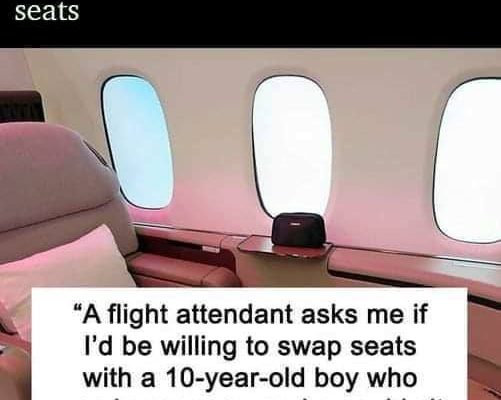In today’s world of air travel, it’s not unusual to face unexpected situations—whether it’s overbooking, tight seating arrangements, or just the unexpected surprises airlines throw at you. One such scenario happened to a 23-year-old woman who had been lucky enough to score a first-class upgrade on her long flight to San Francisco. But that luck soon came with an awkward dilemma.
The Unexpected Upgrade
The story begins with this young woman planning a vacation to San Francisco. She had booked her flight tickets a year in advance and was thrilled when she was offered a complimentary upgrade to first class, thanks to her frequent flyer status and accumulated travel points. Like anyone would, she happily accepted, looking forward to a comfortable 13-hour journey. She even took advantage of all the perks that came with the upgrade, including enjoying the first-class lounge before the flight.
A Request at 30,000 Feet
However, about an hour into the flight, a flight attendant approached her with an unexpected request: Would she consider giving up her first-class seat for a 10-year-old boy who was sitting in economy class? It turned out that the boy’s parents had also received upgrades, but his ticket didn’t qualify, which left him separated from them.
The flight attendant tried to offer a few alternatives to make the situation more appealing. She mentioned that the woman could receive a full refund for her ticket or get another complimentary upgrade on a future flight. Despite these offers, the woman felt an uncomfortable pressure—as if she had no real choice but to move. After all, the flight attendant noted, since the boy’s parents were in first class and the woman was the only other passenger who had received an upgrade, it would make sense for her to give up her seat so the family could be together.
A Difficult Decision
The woman understood the situation. She empathized with the boy and his parents. Still, she had earned that upgrade. She had planned this trip for a long time, and this opportunity to fly first class was something she had been really looking forward to. So, she asked politely if she could keep her seat. To her relief, the flight attendant was understanding and accepted her decision gracefully without further pressure.
Yet, that didn’t mean the situation ended without judgment. An elderly woman sitting next to her made a snide comment about “forcing a child to sit alone for a long flight.” The comment made her feel conflicted and guilty, especially as she watched the boy make trips up and down the aisle to visit his parents. Though he wasn’t completely alone, it was clear he wasn’t entirely comfortable either.
Second-Guessing Her Choice
As the flight went on, the woman couldn’t help but reflect on her decision. Had she made the right call? Was it selfish of her to keep the first-class seat she had earned? On the one hand, she understood why others might see her decision as inconsiderate—after all, it was a young child who was being separated from his family. On the other hand, she had no prior connection to the boy or his family, and she had worked hard to earn the upgrade. This was supposed to be her reward, her chance to enjoy a comfortable journey after planning and accumulating points for so long.
She couldn’t shake the uneasy feeling of being judged by those around her, and the comments from the elderly woman next to her made her question herself. Still, she chose to stay in her seat. After all, there was no guarantee that the boy would have been entirely happy even if she had moved—he seemed content visiting his parents and then returning to his own seat in economy.
The Reality of Modern Air Travel
In the end, the woman enjoyed the comfort of her first-class seat, but the uncertainty of whether she had made the “right” decision stayed with her. The reality of air travel today is that situations like these are often complex, with no definitive right or wrong answer. It’s easy for bystanders to pass judgment, but each person has their own reasons for the choices they make.
Whether or not it was selfish to keep her seat, she ultimately made a decision based on her own needs and the effort she had put in to earn that upgrade. Sometimes, the decisions we make in these situations aren’t perfect—they’re human. And in the confined space of an airplane cabin, with everyone making their own assumptions, it can be tough to know if you’ve done the right thing.



